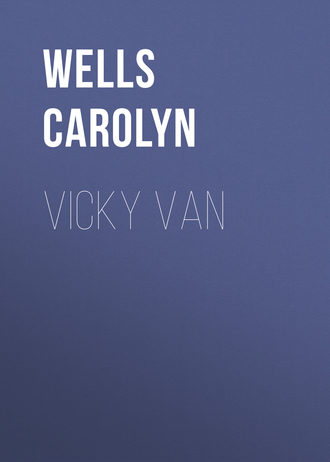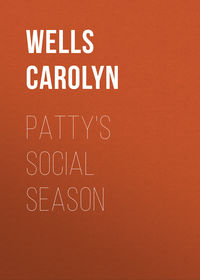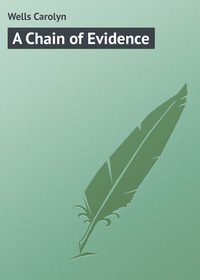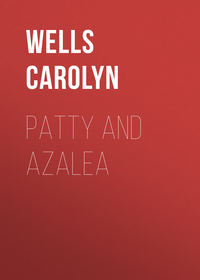
Vicky Van
Again Stone examined the walls, but the immaculate white and gold sides of the music room said nothing intelligible to me, and if they spoke to him he did not divulge the message. The women exclaimed at the beautiful room, and, as Stone's examination here was short, we all filed back to Vicky's bedroom.
I heard no sound of her, and I breathed more freely, as we did not find her in bedroom or in the boudoir beyond. She had, then, succeeded in getting away, and trusted to me not to betray her presence there.
The boudoir or dressing-room, all pink satin and white enameled wicker called forth new exclamations from Winnie, and even Rhoda Schuyler expressed a grudging admiration.
"It is beautiful," she conceded. "I wish Ruth had come, after all. She loves this sort of furniture. Don't you remember, Sarah, she wanted Randolph to do up her dressing-room in wicker?"
"Yes, but he didn't like it, he said it was gim-crackery. And the
Circassian walnut of Ruth's room is much handsomer."
"Of course it is. Ruth has a charming suite. Oh, do look at the dresses!"
Fleming Stone had flung open a wardrobe door, and the costumes disclosed, though not numerous, were of beautiful coloring and design. Winnie, unable to resist the temptation, fingered them lovingly, and called my attention to certain wonderful confections.
"What did she wear the night of the crime?" Stone asked, and I told him. Having Win for a sister, I am fairly good at describing women's clothes, and I drew a vivid word picture of Vicky's gold fringed gown.
"Heavenly!" exclaimed Winnie, although she had had me describe the gown to her on the average of twice a day for a week. "I wish I could see it! Some day, Chet, I'm going to have one like it."
"Fringe?" said Stone, curiously, "do women wear fringe nowadays?"
"Oh, yes," I responded. "But it was a long fringe of gilt beads that really formed an overdress to the tulle skirt. Stay, I've a piece of it," and I took out my pocketbook. "See, here it is. I found it caught in those gilded leaves at the lower corner of the mirror frame—that long dressing-mirror."
They all looked at the mirror, which hung flat against the wall; its foliated Florentine frame full of irregular protuberances.
"Of course," said Winnie, nodding her head, "I know just how she stood in front of it, whirling around to see her gown from all sides, like this." Win whirled herself around, before the glass, and succeeded in catching a bit of her own full skirt on the frame.
"You little goose!" I cried, as the fabric tore, "we don't need a demonstration at the expense of your frock!"
Fleming Stone was studying the strand of gold fringe. It was composed of tiny beads, of varying shapes, and had already begun to ravel into shreds.
"I'll keep this," he said, and willy-nilly, I lost my little souvenir of Vicky Van. But, of course, if he considered it evidence, I had to give it up, and the fact of doing so, partly salved my conscience of its guilty feeling at concealing the fact of Vicky's presence in her own house just then.
And, too, I said to myself, Mr. Stone is out to find her. Surely a detective of his calibre can accomplish that without help of an humble layman! So I kept my own counsel, and further search, of the next story, and later, of the basement rooms, gave no hint of Vicky's presence or departure.
Indeed, I began to wonder if I had really seen her. Could she have been so clearly in my mind, that I visualized her in a moment of clairvoyance? My reason rebelled at this, for I knew I saw her, as well as I knew I was alive. She had on the same little hat in which I had last seen her. She had on no cloak, and her tailor-made street dress was of a dark cloth. I couldn't be sure how she got away, for the basement door we found bolted on the inside, but she must have warily evaded and eluded us and slipped here and there as we pursued our course through the house, and then have gone out by the front door when we were, say, on the upper floors.
Returning to Vicky's boudoir, where her little writing-desk was,
Fleming Stone began to run over the letters and papers therein.
It was locked, but he picked the flimsy fastening and calmly took up the task with his usual quick-moving, efficient manner.
I stayed with him, and the three women wandered back over the house again. He ran through letters with glancing quickness, flipped over sheafs of bills, and examined pens, ink and paper.
"There's so much that's characteristic about a desk," he said, as he observed the penwiper, stamps, pin-tray, and especially the pencils. "Indeed, I feel now that I know Miss Van Allen as well, if not better than you do yourself, Mr. Calhoun."
"In that case, then, you can't believe her guilty," I flashed back, for the very atmosphere of the dear little room made me more than ever Vicky's friend.
"But you see," and he spoke a bit sadly, "what I know of her is the real woman. I can't be deceived by her wiles and coquetries. I see only the actual traces of her actual self."
I knew what he meant, and there was some truth in it. For Vicky was a mystery, and I was not by any means sure, that she didn't hoodwink us when she chose to. Much as I liked and admired the girl, I was forced to believe she was not altogether disingenuous. And she was clever enough to hoodwink anybody. But if Stone's deductions were to be depended on, they were doubtless true evidence.
"Is she guilty?" I sighed.
"I can't say that, yet, but I've found nothing that absolutely precludes her guilt. On the contrary, I've found things, which if she is guilty, will go far toward proving it."
This sounded a bit enigmatical, but Stone was so serious, that I grasped his general meaning and let it go at that.
"I mean," he said, divining my thoughts, "that things may or may not be evidence according to the guilt or innocence of the suspect. If you find a little boy in the pantry beside an empty jampot, you suspect him of stealing jam. Now, if lots of other circumstances prove that child did take the jam, the empty pot is evidence. But, if circumstances develop that convince you the child did not have any jam whatever, that day, then the jampot is no evidence at all."
"And you have found empty jampots?" I asked.
"I have. But, so far, I'm not sure that they are condemnatory evidence. Though, in justice to my own work, I must add, that they have every appearance of being so."
"You already like Vicky Van, then," I said, quickly, moved to do so, by a certain note of regret in his voice.
"No man could help liking a woman who possesses her traits. She has delightful taste and tastes. She is most charitable, her accounts show sums wisely expended on worthy charities. And letters from friends prove her a truly loyal and lovable character."
"Such a girl couldn't kill a man!" I broke out.
"Don't say that. There is no one incapable of crime. But such a nature would require very strong provocation and desperate conditions. These granted, it is by no means impossible. Now, I am through for to-day, but, if you please I will keep the key of the house. As the case is now in my hands, you will not object?"
"No," I said, a little reluctantly. For suppose Vicky should give me another commission or ask me to perform another errand in the house.
"You have a transparent face, Mr. Calhoun," and Fleming Stone smiled quizzically. "Why do you want to keep the key?"
"My aunt is most desirous of seeing this house," I deliberately prevaricated, "and I thought—"
But I didn't deceive the astute detective. "No, that isn't it," he said, quietly. "I'm not sure, but I think you are in touch with Miss Van Allen."
"And if I am?" I flared up.
"Very well," he returned, "it is, as you imply, none of my business. But I want to know your attitude, and if it is antagonistic to my work, I am sorry, but I will conduct my course accordingly."
"Mr. Stone," I confessed, "I am not antagonistic, but I do know a little about Miss Van Allen's movements that I haven't told. I cannot see that it would assist you in any way to know it—"
"That's enough," and Fleming Stone spoke heartily. "Your assurance of that is sufficient. Now, are we working together?"
I hesitated. Then I suddenly thought of Ruth Schuyler. I owed her a business fealty, and somehow I liked to feel that I also owed her a personal allegiance, and both these demanded my efforts to avenge the death of her husband, irrespective of where the blow might fall.
So I said, honestly, "We are, Mr. Stone. I will help you, if I can, and if at any time I think my withheld information will help you, I will make it known. Is that satisfactory?"
"Entirely so," and the handshake that Stone gave me was like a signed and sealed bond, to which I tacitly but none the less truthfully subscribed.
CHAPTER XV
FIBSY
Next morning as I started for my office, I found myself combating a strong impulse to call in at Ruth Schuyler's. I had no errand there, and I knew that if she required my services she would summon me. It was no longer incumbent on me to try to unravel the murder mystery. Fleming Stone had that matter in charge, and his master-mind needed no assistance from me.
And yet, I wanted to stop at the Fifth Avenue house, if only for a moment, to reassure myself of Ruth's well-being. Though above me in social rank, the little widow seemed to me a lonely and pathetic woman, and I knew she had begun to depend on me for advice and sympathy. Of course, she could turn to Fleming Stone, but, in a way, he was adviser of the Schuyler sisters, and I knew Ruth hesitated to intrude on his time.
I was still uncertain whether to call or not, and as I walked along the few feet between my own house and the Avenue, I crossed the street as I reached Vicky Van's house, and naturally looked at it as I passed.
And after I had passed the flight of brownstone steps, and was going along by the iron fence, I turned to look at the area door. This was my performance every morning, and always without thought of seeing anything of importance.
But this time the area door stood half-way open, and looking out was a boy, a red-headed chap, with a freckled face and bright, wise eyes.
I turned quickly and went in at the area gate.
"Who are you?" I demanded, "and what are you doing here?"
"I'm Fibsy," he said, as if that settled it.
"Fibsy who?" I asked, but I dropped my indignant tone, for the lad seemed to be composedly sure of his rights there.
"Aw, jest Fibsy. That's me name, because, if you want to know, because
I'm a natural born liar and I fib for a living."
He was impudent without being offensive; his wide smile was good-natured and the twinkle in his eye a friendly one.
"I got yer number," he said, after a comprehensive survey of my person, "you're C. Calhoun. Ain't you?"
"I sure am," I agreed, meeting his taste for the vernacular, "and now for your real name."
"Terence McGuire," he smiled, and with a quick gesture he snatched off his cap. "C'mon in, if you like. I'm F. Stone's right-hand man."
"What!" I cried, in amazement.
"Yep, that's what. I'm—well, I like to call myself his caddy. I follow him round, and hold his clues for him, till he wants one, then I hand it out. See?"
"Not entirely. But I gather you're in Mr. Stone's employ."
"You bet I am! And I'm on me job twenty-four hours a day."
"And what is your job just now?"
"Well, since eight A.M. I've been holdin' up this door, waitin' for yer honor to pass by. An' I got you, didn't I?"
"Yes, I'm here." I stepped inside and the boy closed the door. We went into the front basement room, where there was a lighted gas stove.
"I camp here, 'count o' the heats. There's no use gettin' up the steam fer the few casual callers that drops in at present. Now, Mr. Calhoun, I don't want to be stuffy nor nuthin', but Mr. Stone said I might ask you some few things, if I liked an' you can answer or not, as you like. This ain't no orficial investigation, but I s'pose you're as intrusted as anybody in findin' this here Victoria Van Allen?"
"I'm interested in finding the murderer of Mr. Schuyler," I replied.
"An' maybe they ain't one an' the same. That's so." He spoke thoughtfully and scanned my face with a quizzical glance. "But, of course, Mr. Stone'll find out. Now, Mr. Calhoun, if you don't mind, will you give me a line on that maid person, that Julia?"
"Julie, she is called."
"All right, Julie goes. Is she a young thing?"
"No; just this side of middle-aged. Probably thirty-five or so."
"Good looker?"
"Why, about average. Brown hair, brownish eyes—really, I never noticed her closely enough to think about her appearance. She is, I'm sure, a good servant and devoted to Miss Van Allen."
"But don't you know anything special? Anything that would pick her out from a lot of other good servants?"
"In appearance, you mean?"
"Yes."
"I can't think of anything. Let me see. She wears glasses—"
"What sort?"
"I don't know. Just ordinary glasses, I guess."
"Spectacles or nose-riders?"
"I'm not sure. Spectacles, I think. And she has a great many gold-filled teeth."
"Front ones?"
"Yes, that is, they're very noticeable when she speaks to you."
"Well, that's sumpum. Is she quick and spry-like, or poky?"
I smiled at the boy's eagerness. "She's rather alert," I said, "but, of course, quiet and respectful. I never looked at her with any personal interest, so I can only give you my general impressions."
"You see, it's this way," and the boy looked very serious, "wherever Miss Van Allen is, that Julie's there, too. And when Miss Van Allen wants errands done, of course, she sends Julie. And, of course, said Julie is disguised. I dope out all this has to be so. For Miss Van Allen has mailed letters and—oh, well, of course she could mail letters in lots of ways, but sumpum tells me, that she depends on Miss Julie as an errand girl. So, I want to find out the look of the Julie person, and see if I can't track her down, and so get at Miss Van Allen. Vicky Van, I believe her friends call her."
"They do," said I, looking sternly at the boy, "and I'll say right here, that I'm one of her friends, and I won't stand for any impertinence or any remarks of any sort about that lady. If she is suspected of this crime, let the law take its course, but until there is some direct evidence, don't you dare to connect her name with it."
"I'm only obeying Mr. Stone's orders. And, take it from me, Mr. Calhoun, I ain't so fresh as to make remarks about a lady. I'm a prevaricator of the truth, but only when it's abserlutely necessary. And on the other hand, I'm a born protector of women. Why, I'd be only too tickled to find a gentleman suspect. Or, at least, to clear Miss Van Allen from all s'picion."
"Why do you feel such a kindly interest in the lady?"
"This house, for one reason. You see, I've been all over it, at Mr. Stone's orders, and I ree'lize what a nice lady she is. I don't have to see her, to understand her tastes and her 'complishments. Why, jest the books on her centre tables and the records for her phonograph spell her out for me, in words of one syllable. And, though I'm hunting for her, it isn't with a solid hunch that's she's the knife-sticker. Not by no means. But find her I've gotto! Because F. Stone says for me to."
I looked at the boy more curiously. He was a strange admixture of street boy and sleuth. His quick, darting eyes were never still, but warily alert to catch the meaning of any sound or motion on my part. I felt as if he read me through, and would not have been surprised to have him tell me he knew of my recent communications with Vicky. But I only said, "You are, then, Mr. Stone's right-hand man?"
"I put it that way, yes. But really, I'm his apprentice, and I'm learning his trade. I study his methods, and I add some gumption of my own, and if I can help him, I'm glad and happy. And anyway, I'm learning."
"And this talk about your lying? Is that straight goods?"
"If it is, how can you believe what I tell you?" he asked, whimsically. "But, I used to be a fierce liar. Then, gettin' in with F. Stone, made me see it's wrong to lie—usuerly, that is. So I don't, now—leastways, not much. Only when it's jest the only thing to do to save game."
"How does Mr. Stone know when you're telling the truth, then?"
"Good land, I don't lie to him! I wouldn't, and if I did, it wouldn't be any use. He'd see through me, quicker'n scat! But, honest, I wouldn't. You see, he's my idol, yes sir, my idol, that's what that man is! Well, Mr. Calhoun, as you've told me all you can pry loose from your stock of infermation, you an' me may as well make our adooses."
"How do you know I haven't revealed all I know of the case?"
"Oh, I read from your mobile counternance that you're keepin' sumpum back, but it don't matter. F. Stone'll nail it, when he gets good an' ready. What I wanted from you was mostly the speakin' likeness of the Julie dame. An' I guess I got it. Oh, say, one other thing. Who among Miss Van Allen's friends is an artist?"
"Miss Gale is one. Miss Ariadne Gale."
"Thank you, sir. And will you gimme her address?"
I did so, and then I went away, thinking Fleming Stone a queer sort of detective to have for assistant such an illiterate, uncultured boy as Fibsy. The name was enough to condemn him! But as I thought the little chap over, I realized that his talk had been clear-headed and to the point, besides showing sagacity and perspicacity.
It was growing late, but after this interview I felt I must see Ruth for a few minutes, so called at the Schuyler house.
She greeted me cordially and seemed glad to see me. Winnie was still acting as secretary for her, but the rush of notes of condolence was over, and as Ruth was not, of course, giving or accepting social invitations, there was not so much work for Win as at first. But the two had become fast friends, and Winnie told me how they sat together chatting often for pleasant half hours at a time.
I told Ruth about the strange boy at Vicky Van's house.
"Yes," she said, "I've heard about him. Mr. Stone picked him up somewhere and he uses him as a sort of outside scout. He has all confidence in him, though I believe the little chap rejoices in the name of Fibber."
"Fibsy," I corrected. "He is certainly a bright youth. And he plans to hunt down Miss Van Allen by means of her maid, Julie."
"Are they together?"
"We only suppose so. It seems probable, that Miss Van Allen would want the help, if not the protection of her servant. Julie is a most capable woman, and devoted to her mistress."
"I've heard so. I have a kind, thoughtful woman, too, and I should miss her terribly were I without her."
"Oh, but your Tibbetts is a servant, and nothing more. This Julie was a real friend to Miss Van Allen, and looked after her in every way. Housekeeper, maid, nurse, and general bodyguard."
"Yes, Miss Van Allen must have needed such a person, since, as I am told, she lived alone. My sisters-in-law are quite in love with the Van Allen house. Both they and Winnie have been singing its praises this morning. It seems your Vicky Van is a lady of most refined tastes."
"She certainly is. I can't help thinking if you and she had known each other, in favorable circumstances, you would have been friends."
"It may be. I have never felt sure that she is the guilty one, but I have changed my mind about not wanting her to be found. I do want that she should be. Mr. Schuyler's sisters have shown me that to hesitate at or neglect any means of hunting her out would be wrong. And so, I am glad we have Mr. Stone and I hope he will succeed in his search."
"What changed your mind, especially?"
"I realized that it would be disloyalty to my husband's memory to let his possible slayer go free. The girl must be found, and then if she can be freed of suspicion, very well, but the case must be investigated fully."
"I dare say you are right. Mr. Schuyler was a man of importance and influence, and aside from that, every deed of blood calls for revenge. I honor you for deciding as you have."
"It is justice that moves me, more than my personal inclination," Ruth went on. "I will not deny, Mr. Calhoun, that in some ways, my husband's death has freed me from certain restrictions that hampered and galled me. I shouldn't mention this to you, but I know the sisters have told you that I have, in many ways, gone counter to Mr. Schuyler's wishes, since I have been my own mistress. It is true. He and I disagreed greatly on matters of the household and matters of my personal comfort and convenience. Now that I can do so, I am arranging my life differently. It is natural that I should do this, but the Schuyler ladies think that I have begun indecently soon. I say this, not by way of apology, but because I want you to understand."
Ruth looked very sweet and wistful, as she seemed to make a bid for my sympathy. I was impressed anew by the soft pallor of her face and the sweet purity of her gray eyes. I contrasted her with Vicky Van. One, the embodiment of life and gayety, the other a gentle, dovelike personality, which, however, hinted sometimes at hidden fires. I believed that Ruth Schuyler had been so repressed, so dominated by her brute of a husband, that her nature had never expanded to its own possibilities.
And, like a blinding flash of lightning, the knowledge came to me that I loved her! It was no uncertain conviction. The fact sprang full-armed, to my brain, and my heart swelled with the bliss of it.
I scarcely dared look at her. I couldn't tell her—yet. I had no reason to think she cared for me, other than as the merest acquaintance, yet, then and there, I vowed to myself that she should care.
I thought of Vicky Van—poor little Vicky. She had interested me—did interest me, but in only a friendly way. Indeed, my interest in her was prompted by sympathy for her luckless position and the trust she had reposed in me, I would hold her trust sacred. I would never play false to Vicky Van. But henceforth and forever my heart and soul belonged to my liege lady, my angel-faced Ruth.
"What is the matter, Mr. Calhoun?" I heard her saying, and I looked up to see her smiling almost gayly at me. "Your thoughts seem to be a thousand miles away!"
"Oh, not so far as that," I protested. Somehow, I felt buoyantly happy. I had no wish to tell her of my love, at present I was quite content to worship her in secret, and I exulted in a sort of clairvoyant knowledge that I should yet win her. I smiled into her dear eyes, as I continued: "They were really round the corner in Vicky Van's house."
To my delight she pouted a little. "Let's talk of something else," she said. "I've no doubt Miss Van Allen is charming, and her home a perfect gem, but I own up I'm not anxious to discuss her all the time and with every one."
"You shall be exempt from it with me," I promised. "Henceforth her name is taboo between us, and you shall choose our subjects yourself."
"Then let's talk about me. Now, you know, Mr. Calhoun, I never see Mr. Bradbury, so you must be my legal adviser in all my quandaries. First, and this is a serious matter, I don't want to continue to live with the Schuyler ladies. We are diametrically opposed on all matters of opinion, and disagree on many matters of fact." Ruth smiled, and I marveled afresh at the way her face lighted up when she indulged in that little smile of hers. "Nor," she went on, "do they want to live with me. So, it ought to be an easy matter to please us all. As to the house and furnishings, they are all mine, but if the sisters prefer to live here, and let me go elsewhere, I am willing to give them the house and its contents."
"I know you don't care for this type of residence," I said, "indeed, Miss Schuyler said yesterday, as we looked over Vicky Van's house, that it was just the sort of thing you liked."
"Oh, I can't think I would like her house! I supposed it was a plain little affair. Harmonious and pretty, Winnie says, but she didn't give me the impression it was elaborate."
"No, it isn't. And it wouldn't be as grand as your home ought to be.
But mention of the girl is not allowed, I believe—"
She smiled again, and resumed: "Well, I want you to sound the Schuyler sisters, and find out their wishes. When I speak to them, they only say for me to wait until after the mystery is solved and all this horrid publicity and notoriety at an end. But I want to go away from them now. I want Mr. Stone to do his work, and I hope he will find that girl and all that, but I can't stand it to live in this atmosphere of detectives and reporters and policemen any longer than I must. Would it do for me to go to some quiet hotel for a while? I could take Tibbetts, and just be quietly by myself, while the Schuylers continue to live in this house."









